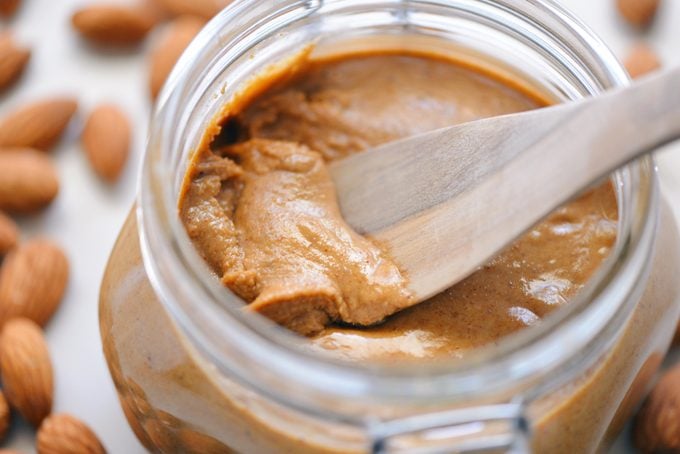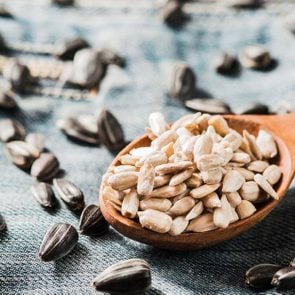Is Almond Butter Healthy? 4 Things Nutritionists Want You to Know
Updated: Mar. 16, 2022
Switch up your usual peanut butter for almond butter. Here's how and why you might want to incorporate it into your diet, according to a registered dietitian.
Is almond butter good for you?
Everyone knows peanut butter. But this popular nut butter isn’t the only spread in town. Nut butters are a popular and healthy food trend filled with lots of tasty choices.
In the last 10 years, interest in almond butter alone grew more than 300 percent, according to Google Trends, and the almond butter market is predicted to double in the next five years.
As a nutritionist, this is not surprising. In fact, people ask over and over again if nut butters are healthy. The simple answer is that almond butter absolutely is healthy. But as with everything else, you need to keep in mind serving size and what you pair with it.
Here’s what you need to know about adding almond butter to your diet.
Almond butter has benefits for your heart
Almond butter contains a good balance of monounsaturated and polyunsaturated fats, which are healthy fats. These fats help decrease instances of cardiovascular disease by helping to lower blood pressure and cholesterol, according to 2019 research published in Lipids in Health and Disease.
And, while almond butter does not appear to affect HDL (the good cholesterol), it may help to lower your LDL (or bad) cholesterol by reducing the development of plaques that clog arteries, according to 2015 research in the Journal of Food Science and Technology.
Research in the more recent study also found that almond butter may help people control their blood sugar and even their weight, which is essential for a healthy heart.
Almond butter vs. peanut butter: Almond butter had advantages
Some people might see almond butter as the less attractive cousin to peanut butter. But in the almond butter vs. peanut butter debate, I say almond butter has many more health benefits—and it’s not even a close call.
Almond butter has loads of vitamins and minerals and a fair amount of healthy fats. If we compare peanut butter and almond butter side by side, almond butter is much more nutrient-dense than peanut butter because of its fiber, vitamins, and minerals.
It’s also important to note that most peanut butter has added sugars, to enhance its flavor. So, in addition to fewer nutrients, peanut butter often has more fat and calories.
Here’s a more detailed look at some of the nutrients in almond butter:
Calcium
Of all nuts, almonds are among the highest in calcium: a handful of almonds (1 ounce, or about 22 nuts) gives you about 8 percent of your daily Recommended Dietary Intake (RDI) of calcium.
Calcium is vital for healthy bones and teeth. So if you’re someone who doesn’t consume dairy, but you are concerned about your calcium intake, a handful of almonds, in addition to adding dark leafy greens to your diet, can help you maintain optimal bone health.
Magnesium
The same handful of daily almonds contains about 80 mg, or approximately 20 percent of your RDI, of magnesium. One of magnesium’s most important jobs is to regulate muscle function throughout the body—and don’t forget that this includes the heart muscle.
Magnesium helps the heart maintain a healthy rhythm, helps control your blood pressure, and helps control the production of cholesterol, all of which is good for a healthy heart.
Magnesium is also great for sleep—helping you regulate your sleep cycle, even helping you to drift off to sleep.
Vitamin E
Almonds contain relatively high levels of vitamin E. Just one ounce of almonds (about 22 nuts) gives you around half of your daily requirement (7.27 mg).
Vitamin E contains antioxidants which help to prevent cell damage in your body. Antioxidants are also vital to keep your immune system working well.
Fiber
Every serving (22 nuts) of almonds gives you 4 grams of fiber. Fiber helps control blood glucose levels, maintain healthy bowel function, and lower cholesterol as it helps to draw the cholesterol away from the body.
Daily intake of fiber is different for women and men. Women should aim for 25 grams of fiber per day, while men should target 38 grams—this is equal to about 14 grams for every 1,000 calories consumed. This means that a serving size of almond butter will give women about one-sixth of their required daily fiber, and about one-tenth of what men need.
Don’t forget about calories
Just because almond butter contains healthy fats with loads of nutrients doesn’t mean you should fill your pantry with it. It’s always important to understand portion sizes.
The appropriate serving of fat is 1 tablespoon—no matter the type of fat. There are heart health benefits from monounsaturated fat (lower risk of heart attack and stroke) or polyunsaturated fat (lower blood sugar, reduces triglycerides, and lowers blood pressure).
Still, these benefits are lost if you’re consuming five times the recommended daily amount. Five tablespoons of almond butter, for example, contain 500 calories, and 46 grams of fat.
There are so many tasty ways to enjoy almond butter
The best-kept secret about almond butter is that it’s delicious. Here are just a few ideas how to add almond butter to your diet:
Almond butter snack
Almond butter makes for a great mid-morning snack. You can pair it with half an apple for a nutritious treat to hold you over until lunch. Or substitute the apple for a cup of raspberries.
One snack I love: 1 tablespoon of almond butter with a cup of raspberries. It’s what fiber dreams are made of and gives me 11 grams of fiber, which is about 40 percent of my daily goal.
If you’re really short on time, just grab a tablespoon of almond butter out of the jar on your way out of the door.
Almond butter breakfast
I like to add 1 tablespoon of almond butter to my overnight oatmeal for a delicious, filling, healthy start to the day. Or you could toast a high-fiber English muffin, spread it with almond butter, and sprinkle a cup of fresh, organic blueberries on the top.
It’s a quick and easy breakfast that adds fiber and antioxidants to your daily routine.
Replace your go-to nut butter with almond butter
It’s fun to experiment with all the ways you can add almond butter into your diet. A good place to start is to use almond butter as a substitute in places you would usually use peanut butter.
You’ll immediately raise the nutrient density of what you’re eating and, in a balanced diet, and you could experience health benefits due to the substitution.
Bottom line: Almond butter is worth a taste test
The most important takeaway is to pair almond butter with complex carbs or fibrous fruits in their proper portions so you can feel full and enjoy your food without overindulging.
Almond butter is a versatile, healthy, delicious food that can be beneficial if you include it in your diet.
Until now, it’s been one of the best healthy eating secrets I’ve saved for my patients, but with interest in almond butter growing as fast as it is, it looks like it won’t be so secret anymore.























